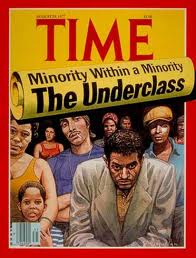 In the 1980s discussion of the formation of an underclass came to the fore in the US. Various writers argued that provision of Assistance to Families with Dependent Children (AFDC) was creating “the danger of permanent segregation of a class of unemployed from the rest of society.” The poverty and perceived reliance on welfare, in black communities in particular, caused concern amongst conservatives. Mickey Kaus, in an article in The New Republic, referred to “a culture of poverty” and described:
In the 1980s discussion of the formation of an underclass came to the fore in the US. Various writers argued that provision of Assistance to Families with Dependent Children (AFDC) was creating “the danger of permanent segregation of a class of unemployed from the rest of society.” The poverty and perceived reliance on welfare, in black communities in particular, caused concern amongst conservatives. Mickey Kaus, in an article in The New Republic, referred to “a culture of poverty” and described:
a ‘community’ where 90 percent of the children are born into fatherless families, where over 60 percent of the population is on welfare, where the work ethic has evaporated and the entrepreneurial drive is channeled into gangs and drug-pushing.
The view that welfare led to a culture of poverty persisted into the 1990s and was argued by conservatives and their think thanks. Robert Rector, senior analyst for welfare and family issues for the Heritage Foundation, claimed in 1996 that “children are suffering because the liberal welfare state has carpet-bombed the moral foundations of the inner city, toppling marriage, gutting the work ethic, and leaving a rubble of social pathology in its wake.” He argued that children were at more risk from growing up under welfare than from poverty, which he suggested wasn’t a big problem. On the other hand, growing up dependent on welfare, he argued, reduces a child’s IQ, “triples the level of behavioural and emotional problems... and doubles the probability a boy will engage in criminal activity and wind up in jail.”
 In the US welfare has been characterised as responsible for creating an underclass of mainly black mothers who have many children so as to receive welfare benefits for most of their lives and avoid work and whose children grow up to become welfare recipients. In fact the average family size of welfare recipients is no larger than the American norm. Only 15 percent of AFCD recipients receive welfare continuously. And not only did most women on welfare not receive it as children but “a majority of daughters who grew up in highly dependent homes did not share the fate of their parents.” Forty percent of mothers receiving AFDC worked while on welfare but did not earn enough to support their family. The problem was not their lack of a work ethic but their inability to keep a job or earn enough to get out of poverty.
In the US welfare has been characterised as responsible for creating an underclass of mainly black mothers who have many children so as to receive welfare benefits for most of their lives and avoid work and whose children grow up to become welfare recipients. In fact the average family size of welfare recipients is no larger than the American norm. Only 15 percent of AFCD recipients receive welfare continuously. And not only did most women on welfare not receive it as children but “a majority of daughters who grew up in highly dependent homes did not share the fate of their parents.” Forty percent of mothers receiving AFDC worked while on welfare but did not earn enough to support their family. The problem was not their lack of a work ethic but their inability to keep a job or earn enough to get out of poverty.
Despite its inaccuracy, the conservative view of welfare has been widely accepted, particularly in government circles. As a result, the Clinton Administration dismantled AFDC in 1996, in an effort to reform welfare and rid America of the culture of dependency.
 The concern in the US about the culture of poverty was also taken up in the UK, encouraged by Charles Murray (pictured) in a 1990 book The Emerging British Underclass. In his first speech as Prime Minister, given on a poor housing estate, Tony Blair spoke of “an underclass of people cut off from society’s mainstream, without any sense of shared purpose.” He described “households where three generations have never had a job”, “estates where the biggest employer is the drugs industry”, “an economy built on benefits, crime, petty thieving and drugs,” and people who have become “detached, not just from work, but also from citizenship in its wider sense.” Like Clinton he reformed the welfare system in an effort to get rid of this underclass.
The concern in the US about the culture of poverty was also taken up in the UK, encouraged by Charles Murray (pictured) in a 1990 book The Emerging British Underclass. In his first speech as Prime Minister, given on a poor housing estate, Tony Blair spoke of “an underclass of people cut off from society’s mainstream, without any sense of shared purpose.” He described “households where three generations have never had a job”, “estates where the biggest employer is the drugs industry”, “an economy built on benefits, crime, petty thieving and drugs,” and people who have become “detached, not just from work, but also from citizenship in its wider sense.” Like Clinton he reformed the welfare system in an effort to get rid of this underclass.
In Australia the government has also took up the rhetoric of an underclass toward the end of the 1990s. Senator Jocelyn Newman, minister responsible for welfare, spoke of “the transfer of welfare dependency across generations” and “an entrenched culture of welfare dependency”. She argued that it wasn’t fair to ask “hard-working” Australians “to underwrite what can only be described as a destructive and self-indulgent welfare mentality” when jobs were available, even if such jobs were undesirable. The Minister for Employment Services, Tony Abbott, justified moves to “crackdown” on dole recipients in terms of wiping out the “culture of welfare dependency” and the rise of the “job snob”. Even Aboriginal activist, Noel Pearson, has argued that welfare dependency is to blame for the plight of Aboriginal people and the loss of traditional culture.
In Canada too, moves were made during the 1990s to deal with a welfare culture. In Alberta Social Services Minister, Mike Cardinal, cut welfare benefits and services in an effort to make welfare less attractive. “The goal is not to make welfare unbearable”, he said, “But it has to be uncomfortable enough that people will try to find an alternative way of living.” As a result of government efforts, he claimed “the vast majority of freeloaders have already left the rolls”. Those remaining needed to be taught a work ethic: “the key for many of these people is just to get back into a routine—to get up every morning, to go to work or classes... they have lost that fundamental sense of routine which is necessary to keep a job.”